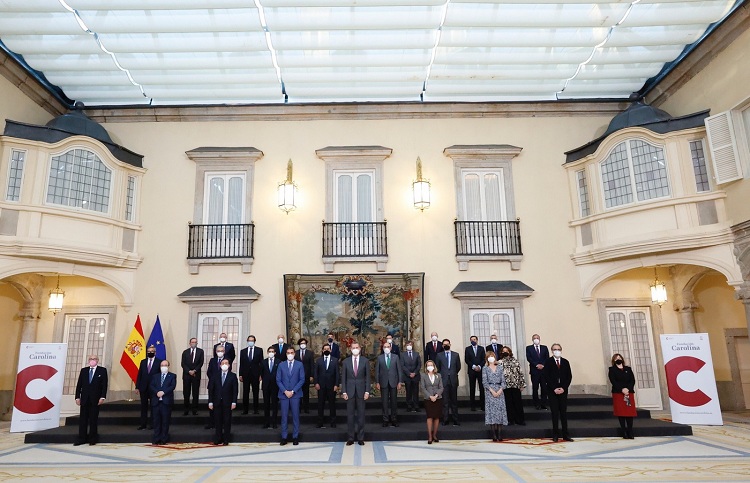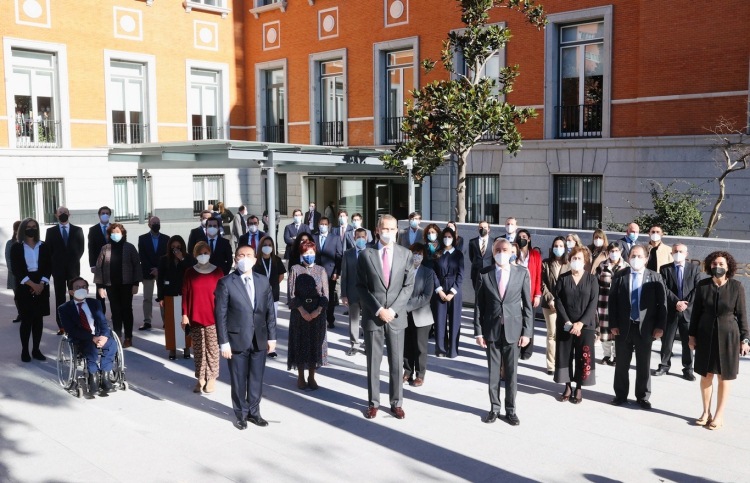The Diplomat
King Philip VI presided yesterday at the Palacio del Pardo in Madrid the 32nd ordinary session of the Board of Trustees of the Carolina Foundation, which approved an Action Plan aimed at the “triple transition” digital, ecological and socio-economic for Latin America.
The Carolina Foundation was established in 2000 to promote cultural relations and cooperation in education and science between Spain and the countries of the Ibero-American community of nations, as well as with other countries with special historical, cultural or geographical ties. The Board of Trustees of the Fundación Carolina, whose honorary presidency is held by the King, is the highest governing, representative and administrative body of the foundation. It adopts its resolutions by majority vote and carries out its functions in accordance with the provisions of the Foundation’s by-laws and the rest of the legal system.
During the meeting, the Board of Trustees approved the institution’s Action Plan for the year 2022, “whose purpose is to contribute, from educational, scientific and technical cooperation with Latin America, to promote a ‘triple transition’ digital, ecological and socio-economic, aimed at generating more just, sustainable and inclusive societies,” according to the foundation.
To this end, the Board of Trustees endorsed a call for 594 postgraduate and doctoral scholarships in all areas of knowledge, “with special emphasis on particularly innovative disciplines in public health, institutional strengthening, gender equality, sustainable finance and climate action,” it continued.
Likewise, the Action Plan foresees an intense activity of knowledge generation, through research and seminars focused on development cooperation, Latin American democracy and European Union-Latin American and Caribbean relations, with a view to the Spanish presidency of the Council of the EU in 2023. The foundation will also undertake public leadership initiatives, through meetings between young people and specialists in gender, communication or higher education.
The session was attended by the President of the Government, Pedro Sánchez; the First Vice-President of the Government and Minister of Economic Affairs and Digital Transformation, Nadia Calviño; the Minister of Foreign Affairs, José Manuel Albares; the Minister of Education and Vocational Training, Pilar Alegría; the Minister of Culture and Sport, Miquel Iceta; and the Minister of Universities, Joan Subirats.
In his speech, the President of the Government highlighted the importance of the Foundation’s training and research initiatives, which “accompany the government’s efforts towards a socioeconomic and sustainable recovery” after the COVID-19 pandemic, in a context “in which reconstruction is only possible from the renewal of the social pact to which all democracies are called”.
For his part, Albares stressed the strength of the foundation’s knowledge networks and global alliances in the face of a year full of challenges, “from the elections in several of the most important countries in the region, to the holding of the Ibero-American Summit in Santo Domingo, or the adoption of the Law on Cooperation for Sustainable Development and Global Solidarity”.
The director of the Carolina Foundation, José Antonio Sanahuja, presented the programmatic vision of the institution’s scientific and academic activities, which are focused on the triple challenge of economic, social and energy transition facing Latin America and the European Union, in order to achieve “stronger cooperation on climate issues, and more inclusive in the labor and economic fields”.






